
Humanity Hallows Issue 6 Out Now
Pick up your copy on campus or read online
By Lucy Madeleine Watson
Writers gathered in Manchester Met’s arts and culture hub Number 70 Oxford Street last week for the annual Creative Writing Summer School. Taking place over two days, the event offered participants the opportunity to experience a flavour of the Manchester Writing School, a chance to talk to current students of the MA and MFA, and included a wide selection of specialist workshops, masterclasses and industry talks from lecturers, practitioners and special guests.
Organised by Manager of the Writing School James Draper, each day included a range of sessions running concurrently, allowing attendees to choose from options geared towards the Writing School’s Writing for Children and Young Adults, Poetry, and Novel routes.
James Draper said the overall ethos for the two days was ‘fun, freedom and creativity’: “We hope that those from fiction might have a go at poetry, or children’s writers might have a go at writing for adults, and that participants will enjoy the opportunity to try something new.
“We have some of our current Masters students and graduates, and those who will be starting our programmes in September, as well as people who are thinking about applying and want to come for a taster session of what we offer. We’ve got a mixed group of participants and we find that this is a really interesting, productive and lively blend of attendees.”
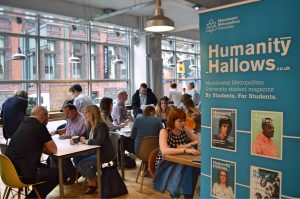
Poet and Academic Director of the Writing School Adam O’Riordan expressed his enthusiasm for the two-day event: “It’s hard to state the kind of alchemy and magic that can happen when big groups of writers get together and work intensely over this time period… It’s such an exciting couple of days.”
After a short welcome and introductory talk, the first choices of the day were, ‘Writing as Listening’ with novelist and Senior Lecturer Joe Stretch, ‘Poems from Our Deep Past’ with Adam O’Riordan, and ‘Exploring Children’s Books’ with Louise Clennell, located in Manchester Met’s Special Collections in the university library.

The second set of morning sessions gave writers the option to explore ‘Idea Generation Theories’ with Associate Lecturer Lara Williams, ‘Crafting Character vulnerability; a look at regret and shame’ with Lecturer in Creative Writing Rachel Genn, or a ‘Writing For Children Masterclass’ with Associate Lecturer Lorrie Porter, the second seminar of the morning to be held in the library’s Special Collections.
Lara Williams talked to Humanity Hallows about the value of the Creative Writing Summer School: “It is really nice to teach something specific and to spend an hour and a half on one particular theme. And it’s great to spend time with such a diverse class of writers from different backgrounds and disciplines, all at different stages in their writing careers.”

After lunch, attendees could choose from three options: ‘Approaching the Memoir, Subjectivity and Taboo’ with Lecturer Monique Roffey, a Poetry Masterclass: ‘Who’s Speaking? Thinking About Narrative Voice in Your Work’ with award-winning poet and Professor of Creative Writing Jean Sprackland, and an Anthologies Workshop with Will Harris and Ian Humphreys from The Complete Works Diversity Initiative.
The final sessions of the day included a ‘Same Plot, Different Genre’ Fiction Masterclass with Associate Lecturer Sarah Jasmon, ‘Preparing for Performance, Voice Skills and Using a Microphone’ with the Royal Exchange Theatre House Poets John Fennelly and Mark Pajak, and a lively ‘Surrealist Games into Poems’ Masterclass with special guest Professor Johnny Payne from Mount Saint Mary’s University in Los Angeles.

The first day closed with an end of year, post-graduate party and showcase, including a reading with Johnny Payne from his new collection Heaven of Ashes.
Payne talked about future links with the Manchester Writing School: “My visit to Manchester Met has given me valuable interaction with an eclectic and eager array of professional and student writers from across Europe.
“I consider the Writing School a sibling to our Los Angeles programme at Mount Saint Mary’s University. Over the next several years, we’ll be doing student and professor exchanges as well as sharing a conference and a literary magazine, making us both more international.”
James Draper welcomed writers on the second day of the event and introduced the Summer School’s Writing Manchester map, where participants were invited to submit poems, stories and reviews to be collated on the interactive map online. The digital project is run by Manchester Met and Yorkshire based literature organisation Wordlife, and showcases a range of literary events, organisations and venues, as well as submissions from local writers.
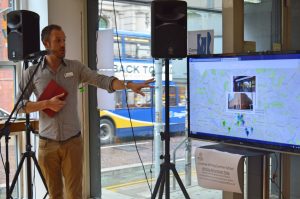
The second day’s sessions began with options, ‘Exercises in Style’, exploring style in fiction, with novelist and Lecturer Gregory Norminton, the first industry talk, ‘How Publishing Works’ with Katie Caunt from Manchester’s Carcanet Press, and ‘Ghost Stories’, a Writing For Children Masterclass with Associate Lecturer Kim Hutson.
“Facilitating and encouraging creativity is an incredibly important thing,” Kim Hutson told Humanity Hallows following her ‘Ghost Stories’ seminar. “Stories are a way of communicating our fears and hopes, and even a way of catastrophising something from the safety of our own imaginations. The Creative Writing Summer School brings people from all kinds of backgrounds to harness this creativity together, in a safe space, where everyone is equal. How amazing is that?”
After a short break, the sessions resumed and the choices were, ‘Pitching to Festivals’ with Alex Corwin from Ilkley Literature Festival, ‘What’s in a Name? The Poetry of Naming’ with Lecturer Helen Mort, and a Manuscript Masterclass: ‘The Jump: from work-in-progress to completed book’ with novelist and Lecturer Catherine Wilcox.
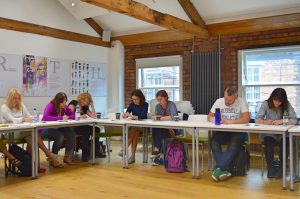
Catherine Wilcox explained why there is such a buzz surrounding the Creative Writing Summer School: “That sense that we’re all fellow travellers, not that we’re experts imparting technical know-how, though there is some element of that, but basically we are cheering one another on, as we, as writers, have been cheered on by other writers before us.
“I think this is a great opportunity, partly to showcase what the Manchester Writing School has to offer, but also just to encourage writing talent, both inside the university and outside. It is really great to be a part of it.”
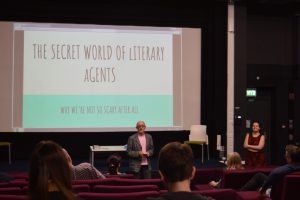
Attendees reconvened after lunch for the afternoon sessions, which included the options, ‘How To Have Your Cake and Read It’ with Lecturer Anjum Malik, ‘Targeting Your Reader: Age Appropriate Writing for Children’ with Novelist and Senior Lecturer Livi Michael, and ‘What Do Agents Do?’ an industry talk with Manchester’s only Literary Agent, Sinead Heneghan.
Following her session, Sinead Heneghan told Humanity Hallows: “It’s really gratifying to be face-to-face with up-coming authors and people who really care about writing. It makes me think more about how I’m working and what I can do to make life better or easier for authors. I am really honoured to be a part of it. Hopefully, next year, I will be back again.”
The final picks of the day included a Pitching Session with Sinead Heneghan or Commissioning Editor Alison Barr, an opportunity for writers to pitch their manuscript and ideas with professional feedback, a Fiction Masterclass ‘How (Not) to Write Bad Dialogue’ with Catherine Wilcox, and ‘What Are the Key Components of a Screenplay?’ with Screenwriter and Visiting Teaching Fellow Hugh Stoddart.
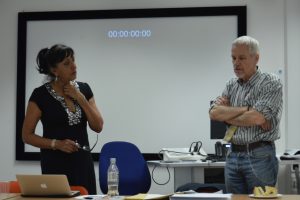
Notably, ‘What Are the Key Components of a Screenplay?’ gave participants a look into the world of media and filmmaking, and its links with creative writing. Hugh Stoddart said: “I still think of screenwriting as creative writing in the way that writing prose or poetry is creative writing. I think of myself as a writer, it’s just that I happen to be a writer in love with the screen. What I’m doing here is I’m coming out of that world and I’m introducing it to people who, perhaps, don’t know that much about it.”
Farewell drinks took place across the road in The Principal Hotel’s stylish Refuge Bar, where writers could discuss and celebrate the successful two days with students, speakers and lecturers.
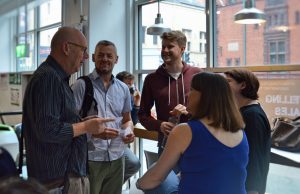
Humanity Hallows’ Editor-in-Chief and MA student Jacqueline Grima said it was great to see so many like-minded creatives gathered at Number 70 Oxford Street: “There was a brilliant atmosphere at this year’s Creative Writing Summer School. The workshops offered something for everyone and the two days were a fantastic opportunity to meet members of the literary industry and learn more about it.”
MA in Creative Writing student R. J. Gardham told Humanity Hallows what he will take away from the two-day event: “The structure of the Summer School allows you to pick different strands, so you learn things outside of your specialty. For instance, I am enrolled on the Novel Route of the MA, but I came away having written a poem! At whatever stage you are in your writing career, there will be something for everyone. I highly recommend!”
For more information on the Manchester Writing School’s Creative Writing Summer School, visit https://www2.mmu.ac.uk/english/courses/short/creative/#summerschool or contact postgradenglish@mmu.ac.uk

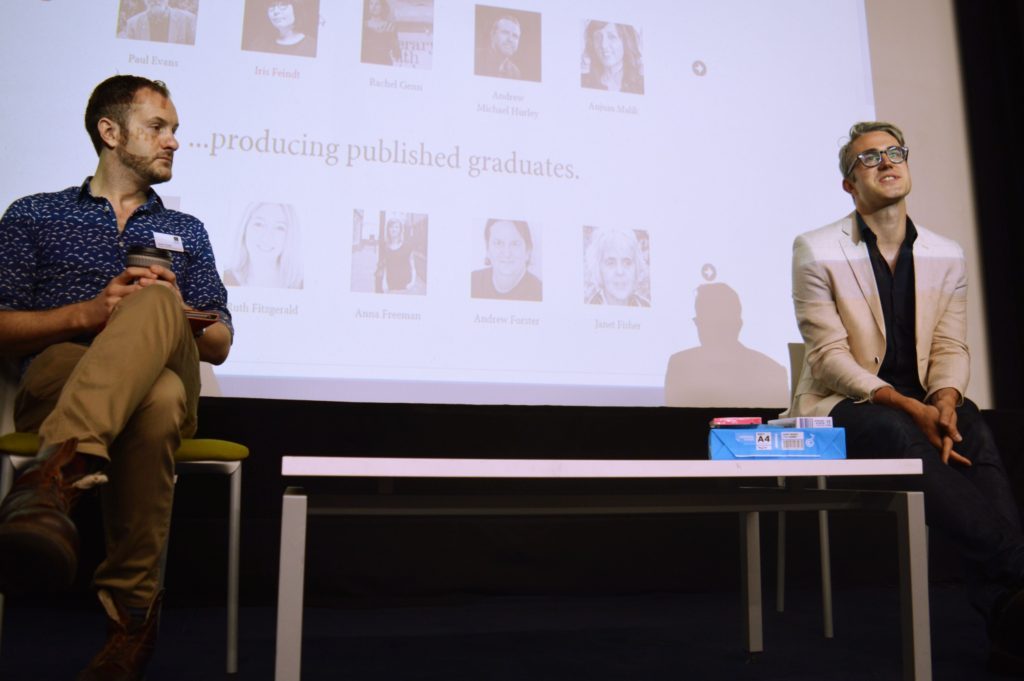














Leave a reply